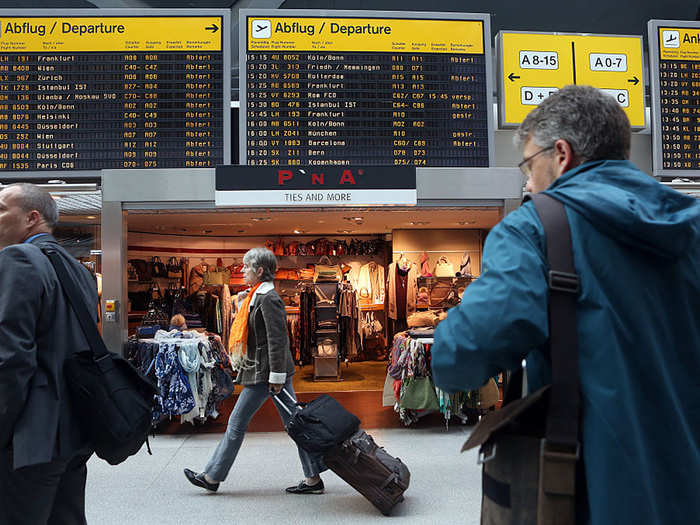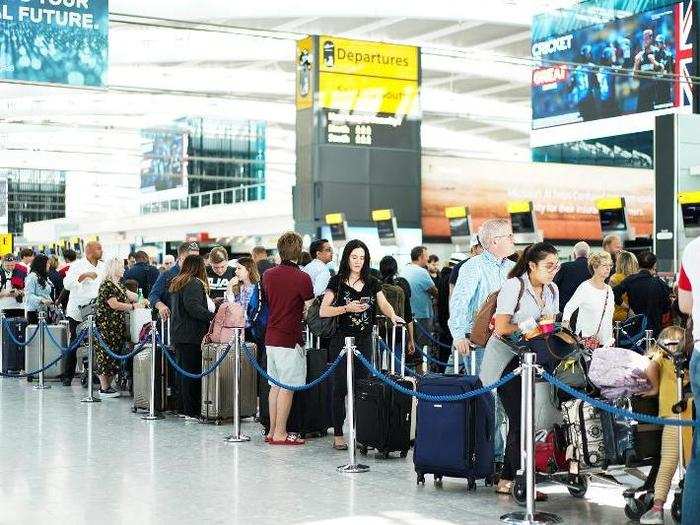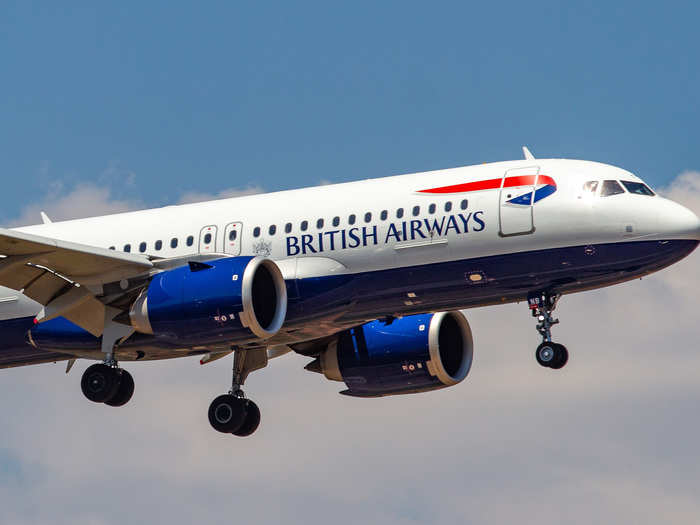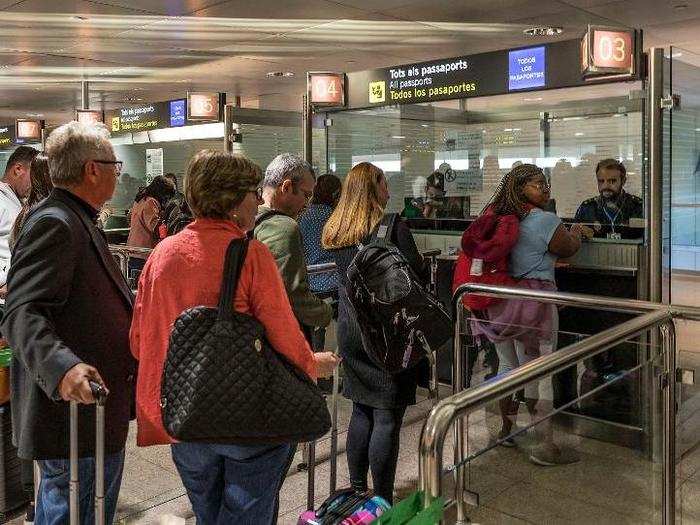- Home
- slideshows
- miscellaneous
- A 'hard Brexit' could have massive consequences for global air travel - here's what we can expect
A 'hard Brexit' could have massive consequences for global air travel - here's what we can expect
What happens to flights into and out of the UK on the day of Brexit

The contingency plan has an expiration date

"In the short term, which is defined as a month, nothing much will happen," said Andrew Charlton, the managing director of Aviation Advocacy, a Switzerland-based strategic-consulting and government-affairs firm.
However, the contingency plan sets only a 12-month period for flights to continue, and after just nine months, the EU and UK will no longer recognize certain aviation and pilot licenses issued by each other.
Effectively, that means that a new deal will have to be implemented well before the deadline, as it can take more than half a year to work out the details of an agreement.
"Seven months is all they've got to go and negotiate a new deal," Charlton told Business Insider in a phone interview.
"So the short term is fine, but the medium term is a bit of a mystery because they'll need to renegotiate," Charlton added.
"Just as on the UK-US side, an interim agreement has been negotiated to at least bridge across, but there are a lot of little areas where there could be some little issues."
For passengers, at least, many of the any finer points or detailed issues that arise while the stopgap basic air-connectivity rules are in place shouldn't have much — or any — noticeable effect on them.
"A lot of issues remain undecided and confusing for consumers in general for Europe. However, for passengers, the situation is quite good," Erotokritou said.
"After Brexit day, passengers traveling from Europe to the UK will still be entitled to rights and compensation, as will those flying from the UK to the EU because the UK has decided to adopt the EU regulation (EC261) that protects passengers."
The impact that a hard Brexit will have on airfares is harder to predict

Charlton said that the many complex factors that make up airfare made it difficult to say what will happen after Brexit — it will also be impossible to figure out the degree to which Brexit has a direct or indirect impact on airfare changes while other factors continue to be in play.
"Airfares and costs have never had any relationship in aviation — it's witchcraft both ways," Charlton said. "If demand is soft because of Brexit, though, the fares would go down. And airfares in Europe are under huge pressure in Europe at the moment to be increased for decarbonization reasons, so it will be very difficult to splice out the bit of the fare that's moving around because of Brexit."
"The fares are going to be more impacted by the ambiance, the overall atmosphere surrounding Brexit, than by any sort of regulatory constraints."
Katie Stepek, the UK and Europe manager for Scott's Cheap Flights — a service that helps users find flight deals — told Business Insider that the lead-up to Brexit was actually causing fares to drop, at least for the summer.
"We're actually seeing a decrease in flight prices because there's so much uncertainty," she said. "A lot of people have been reluctant to book flights, particularly to Europe or going through Europe, over Easter and summer which has led to some really great prices, at least between the EU and the UK."
"Going forward, I think the major impact will be flights from the UK to practically any market, simply because the pound will be so affected — oil trades in USD in every global market, so if the pound drops relative to the dollar, prices for fuel will rise."
Stepek said that although it's possible fares could increase — at least for those originating in the UK — if the value of the pound drops as a result of Brexit's economic fallout, it's still too difficult to predict the impact on prices with any certainty, even for Americans visiting the UK or transiting through on the way to Europe.
"The problem is that everything we're seeing is very uncertain, I don't think anyone can remotely predict what's going to happen with this," she said.
Who owns the airlines and where can they fly

Issues for airlines that operate within the UK — or between the UK and another country — will have more to worry about as the countdown clock on the stopgap agreements begins.
Because the UK participates in the European market, UK carriers are allowed to fly between any points within the EU. That means that an airline like EasyJet, which is based in the UK, is allowed to operate flights between other EU countries — for example, between Paris and Berlin, or Madrid and Milan.
Although EU rules stipulate that airlines flying within the European bloc must be at least 50% European investor-owned, the fact that the UK is in the EU market allowed British-owned and -based carriers to operate within it too.
That wouldn't be the case anymore once Brexit happens.
Because of EU ownership rules, combined with a complicated set of rules known as the "freedoms of the air," which date back to 1944, and various air-services agreements, an airline would not be allowed to fly between two countries that are not its home country.
In other words, easyJet — a British airline — would no longer be allowed to fly between Amsterdam and Budapest, Hungary, and British Airways could not, theoretically, fly between Paris and New York.
This gets complicated by who owns the airline, and what their nationalities are.
To get around these issues, easyJet has gotten a secondary air operator's certificate based in Austria but has a large operation hub at London's Stansted airport. Ryanair has obtained a UK air operator's certificate, essentially becoming partly based in the UK.
Things become even more complicated for airlines owned by the International Airlines Group (IAG), the parent company for British Airways, Iberia, and Aer Lingus, since investors who are UK nationals will no longer count toward that 50% requirement, and European investors won't count toward Britain's similar requirement.
IAG has previously argued that its individual airlines are technically independently owned domestically because of a series of ownership trusts and companies, the Financial Times previously reported.
However, Charlton said, this may not hold up under scrutiny.
"To be frank, there's going to need to be a lot of study done on ownership," he said. "I suspect that it's one of those things where no one has actually asked the question for fear of finding out the answer."
"It's going to be very interesting, [IAG] is going to spend a lot of time making sure that it satisfies both [the UK and the EU], for British Airways on the one hand, and all its other carriers on the other. Somehow, it will need to satisfy requirements, which appear to me, to be contradictory."
Ultimately, the ownership issue will be complicated at best, according to Charlton, and will need to be closely examined and renegotiated as the no-deal Brexit occurs, the backstop measures expire, and long-term agreements are negotiated and implemented.
"There are some serious questions in all this," Charlton said. "How f---ing stupid are these? That we continue to use a regulatory framework from 1944 and try to run the modern aviation industry in that framework. That's genuinely unconscionable. That's genuinely stupid."
New customs procedures for both UK citizens and those who live in the EU

UK citizens will have to go through passport control in EU countries — and vice versa — meaning lines could become significantly longer at airports throughout Europe.
British nationals will also have to apply for an ETIAS (European Travel Information and Authorization) permit before traveling to the EU after Brexit — the applications costs €7.
Ultimately, it's impossible to say what will happen after Brexit Day. The UK's new prime minister, Boris Johnson, has said that the UK would leave the European Union "come what may" on October 31.
However, should calls for a second Brexit referendum or a general election gain traction, or if Parliament chooses to block plans or call a vote of no-confidence, it's possible that Brexit will be further delayed — or canceled altogether. Should that happen, air travel should continue as if nothing had ever happened.
Popular Right Now
Advertisement